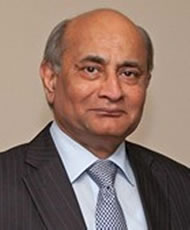Tariq Durrani MSc Electronics, 1967; PhD, 1970
Research Professor, Department of Electronic and Electrical Engineering, University of Strathclyde

What was your first job after graduating?
A post-doctoral Fellow at Southampton.
Southampton still has one of the best and most prolific Electronics Departments in the UK.
What were your major responsibilities/duties in this role and what skills did you develop?
Conducting research on Signal Processing. Collaborated with Fluid dynamist Clive Greated that led to over 20 papers and a research monograph.
What is your current job?
Research Professor, Department of Electronic and Electrical Engineering, University of Strathclyde. This year (2018) I have been elected as a Foreign Member of the US National Academy of Engineering.
What were your major responsibilities/duties in this role and what skills did you develop?
Carrying out research, supporting international activities and links. Enjoying current Visiting appointments/professorships at Princeton, University of Southern California, Stirling (Scotland), and University of Electronic Science & Technology of China (Chengdu). Carrying out professional responsibilities at the IEEE.
What has been your favourite job since you have graduated? Why was it your favourite? What skills did you learn?
Working as an academic at the University of Strathclyde, conducting research and supervising PhDs. Teaching undergraduates/post graduates on courses in my area of expertise. Working as a volunteer in the IEEE (Institute of Electrical and Electronics Engineers), which is headquartered in New York. IEEE is the world’s largest organisation of professional engineers, with over 400,000 members in some 160 countries. The IEEE publishes over 30% of the world’s archival technical literature, and sponsors/co-sponsors over 1300 conferences world-wide. I have been the 2010-2011 IEEE Vice President for Educational Activities, and currently the 2013 IEEE President Elect candidate.
What have been the turning points in your career?
Getting a scholarship to study at Southampton; obtaining a PhD, starting a lectureship at Strathclyde; getting promoted to the first UK Professorship in Signal Processing; appointed Head of one of the largest EEE departments in the UK; appointed Deputy Principal (Pro Vice Chancellor) at the University of Strathclyde. Being awarded an OBE for ‘services to higher education and electronics research’.
What are you most proud of?
Supervising over 40 PhD students, which were some of the most hard-working and brilliant people around.
Good to note that they all have highly successful careers.
Why did you decide to do your course?
Awarded a scholarship by Burmah Oil Company to study for the MSC and PhD in electronics. Southampton had the reputation then of offering the best electronics course in the UK.
How did your education at Southampton prepare you for your chosen career?
A good grounding in fundamentals and good PhD supervision by the late Professor Jim Nightingale.
Why would you recommend studying at Southampton?
Southampton still has one of the best and most prolific Electronics Departments in the UK.
What advice would you give to prospective students looking at the University of Southampton?
Work hard, enjoy the time at the University, and take part in the social life there, benefit from the lovely scenery and environs around Southampton.
What are your future career plans?
Enjoy retirement, and my voluntary involvement with the IEEE.